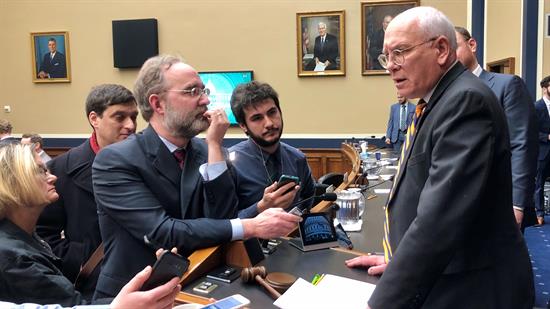- Home
- About
-
Constituent Services
- Academy Nominations
- Community Project Funding
- Congressional Art Competition
- Congressional App Challenge
- Congressional Commendation
- Event Invitation
- Grants
- Help with a Federal Agency
- Internships
- IRA Clean Energy Consumer Benefits
- Know Your Rights: Immigration
- Request a Meeting
- Request Surplus Books
- Presidential Greeting
- Visit Washington D.C.
- Issues & Legislation
- News
- 20th District
- Contact

Press Releases
Tonko Pushes for Reentry Act to Address Opioid CrisisQuestions witnesses during SUPPORT Act field hearing about need for further action to improve access to addiction treatment
Gettysburg, PA,
June 9, 2023
Tags:
Addiction & Recovery
GETTYSBURG, PA — Congressman Paul D. Tonko (D-NY) today joined a field hearing with the Energy and Commerce Subcommittee on Health to give remarks and question witnesses about the ongoing opioid crisis and the importance of driving federal action that ensures access to treatment for the millions of Americans impacted by the disease of addiction. During the hearing, Tonko highlighted his Reentry Act, bipartisan legislation that empowers states to restore access to healthcare, including addiction and mental health treatment, through Medicaid for incarcerated individuals up to 30 days before their release. Tonko’s questions to witnesses can be viewed HERE or read below as prepared for delivery. We’ve seen this in many of our friends and neighbors, our justice system is a revolving door for those struggling with addiction and mental health issues. Over half of people in state prisons and two thirds of individuals in jails have substance use disorder (SUD). The need for uninterrupted and comprehensive coverage for individuals prior to release from incarceration has never been more critical, and the inability of Medicaid to cover otherwise eligible individuals has unintentionally stood in the way, creating burdens for law enforcement and obstacles for individuals who need care. Currently, federal statute prohibits any form of federal health coverage for incarcerated individuals except under very limited circumstances. In most states, Medicaid coverage is immediately terminated when someone is sent to a correctional setting. This creates a serious coverage gap when individuals are released, as they often have no access to health care or addiction treatment during a stressful and dangerous time. Ms. Keller, thank you for your commitment to promoting access to care in honor of your friend Ashley and the many loved ones we have lost to this disease. You mention that in particular you have seen incarcerated individuals struggle with a lack of access to care coordination upon their release.
Thanks to the bipartisan work this committee did together five years ago in the SUPPORT Act, states can now apply for a demonstration program to use Medicaid for eligible services for justice-involved individuals returning to their communities 90 days prerelease. While the demonstration program is wonderful, it is just that — a demo. It can be ripped away at any moment and will require both applications from the state and approval by CMS. I have made the case to my colleagues that we should protect and codify this demonstration program through my Reentry Act. Some are worried about the federal cost, but I strongly believe that this is one of the most effective ways we can save lives through a relatively small change in policy. And let me reiterate I measure success in lives saved and families kept whole. By allowing inmates to receive addiction treatment and other services before returning home, my Reentry Act will bring targeted treatment to those at the highest risk of overdose.
Some of the most vocal advocates for my Reentry Act and the need for prerelease addiction services and coordination of care are law enforcement because they see firsthand how this disease of addiction impacts their community. I’d like to enter for the record a joint letter in support of my Reentry Act from the National Sheriffs’ Association (NSA), the Major County Sheriffs of America (MCSA), the Major Cities Chiefs Association (MCCA), and the National Association of Counties (NACo). Chief Ceravola, some people believe that justice involved individuals are not worthy of treatment or saving. I’ve heard the mindset that perhaps they don’t deserve treatment or are a lost cause. Further, they think of those with addiction as less. I want to personally thank you for reducing stigma, but most of all for seeing humanity in others.
|
